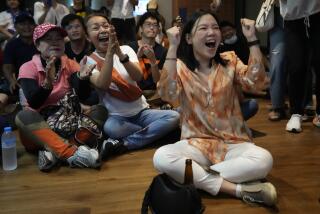Iraqi Opposition Falling Short of U.S. Expectations
WASHINGTON — After pouring tens of millions of dollars into the Iraqi opposition, the United States is quietly trying to rein in the disparate groups, fearing that their ambitious activities might become a political or military liability.
The Bush administration bluntly told Iraqi opposition leaders recently that forming a government in exile could alienate millions of Iraqis fearful that they would have no say after a transition of power, according to U.S. officials.
Within the administration, senior officials have also warned that a planned opposition conference in Kurdish-held northern Iraq in February could anger President Saddam Hussein and provoke retaliation on the Kurds, or even an early war.
In general, the administration is disappointed that the Iraqi opposition has failed to be a strong force in making the case against Hussein to Islamic nations and U.N. Security Council members, U.S. officials say.
After the United States helped reunify six Iraqi opposition groups in August, the administration hoped that they would take an active role in confronting Hussein and building an alternative to his regime. Instead, they have been consumed by squabbling, which delayed their first summit until December and made them almost invisible as a political force.
As a result, the administration has concluded that any new Iraqi leadership is now likely to emerge from within Iraq rather than from the overseas dissidents it has funded and supported for a decade.
“We’ve gone about as far as we can with the opposition, and we’ve accomplished a lot together. But some of these people are loose cannons with their own agendas. They want to plan the next steps first and foremost for their own advantage -- and there’s a real difference between making proper preparations for a transition of power and disenfranchising those who still live in Iraq,” said a well-placed U.S. official who requested anonymity.
For now, the administration’s involvement with the opposition remains a cornerstone of U.S. policy. But expectations have been lowered and the relationship is increasingly moving away from policy issues, U.S. officials say. Administration insiders say that even Vice President Dick Cheney, a stalwart ally of the opposition groups, is increasingly concerned -- an attitude that has had a “chilling effect” on the Pentagon’s support.
“When Cheney took a look at the edifice the U.S. was creating, he apparently decided it couldn’t bear the weight of international scrutiny,” said a U.S. official who asked not to be identified.
“He’s also unimpressed and wary of the growing need to counter [Iraqi National Congress leader] Ahmad Chalabi with an alliance of Kurds and Shiites. These alliances are fraught with all kinds of international complications. Support for the Kurds angers the Turks, and the major Shiite groups are the ones with ties to Iran,” the official said.
Chalabi, a contentious figure even within the opposition, has been a leading force behind the formation of a government in exile and holding a conference of the opposition’s executive committee in northern Iraq.
The State Department is now running 15 Iraqi working groups -- made up of independents and opposition party members -- to develop ideas for everything from managing the oil industry and revamping education to setting up a judiciary.
A small force of Iraqis also recently began training to assist U.S. troops as interpreters and guides if there is a war.
And the administration is still supporting the Iraqi political factions through special envoy Zalmay Khalilzad, who played a similar role with the Afghan opposition. He may attend the opposition’s February conference if it is not delayed by factional differences, U.S. officials say.
The 6 million so-called free Iraqis living abroad or in Kurdish-ruled northern Iraq, which is under the protection of U.S. and British warplanes, could play important roles “in terms of ideas” in any political transition, a senior administration official said.
“But we also recognize that there are 16 or 17 million Iraqis who are not yet free and who want to participate in the formation of a new government, so we think the right thing to do is to wait until liberation. We don’t want Iraqis struggling inside to feel they were excluded.”
U.S. analysts say the decision is tied to other reasons.
“There’s very little belief in [the State Department], the intelligence community and the military that the Iraqi opposition is capable of playing any significant role,” said Anthony H. Cordesman, a policy strategist and Middle East expert at the Center for Strategic and International Studies.
The Iraqi opposition is no longer even loosely compared to Afghanistan’s Northern Alliance, which routed the Taliban regime with U.S. help, according to Robert Malley, a National Security Council staffer during the Clinton administration.
The U.S. decision to back away from the opposition has produced tensions between Washington and many exiles, but also regrets about lost opportunities.
“All Iraqi political groups, the opposition, are 95% focused on power and power-sharing, and no effort has been made to add the brains and talents of Iraqis, thousands and thousands of them, who are critical to the remaking of Iraq,” said Laith Kubba, a co-founder of the Iraqi National Congress.
“It is so unfortunate that Iraqi institutions, political or otherwise, have wasted time and resources and have not addressed the real issues ahead of us.”
*
Times staff writer Jeffrey Fleishman contributed to this report from northern Iraq.
More to Read
Sign up for Essential California
The most important California stories and recommendations in your inbox every morning.
You may occasionally receive promotional content from the Los Angeles Times.










